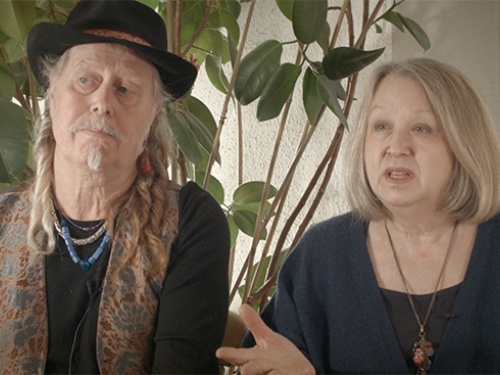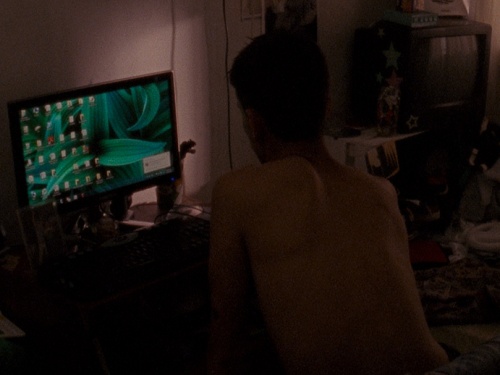Fragments of Kubelka: An interview with Experimenta curator Mark Webber
Our associate curator of artists' film and moving image Steven Cairns, speaks to Mark Webber, curator of the Experimenta strand of this year's 56th BFI London Film Festival - a two-day collaboration with the Festival taking place here on 10 and 11 October.
Webber reveals his enduring enthusiasm for the films of Peter Kubelka, celebrated in the profile screening Peter Kubelka: The Essence of Cinema 11 October; Martina Kudlacek's documentary Fragments of Kubelka also screens on 13 October.
Steven Cairns: When did you first encounter Kubelka and have you worked with him before?
Mark Webber: Peter Kubelka was one of those legendary names I kept seeing when I started to educate myself about avant-garde cinema. Though he's most definitely Austrian, he's very closely connected with the New York scene that until recently was dominant in most histories of artists' film. Kubelka began making films in Europe in the early 1950s but didn't really find kinship and understanding of his work until friendships developed with people like Jonas Mekas, Stan Brakhage, Ken Jacobs and P. Adams Sitney during his first trip to the USA in 1966. I first met him in 1999 at the Whitney Museum, when I co-curated a large film programme for their American Century exhibition. He was there at the opening, and he tried to teach me how to drink wine. I remember him saying that it should leave a tail in the throat. In 2001, I brought him to the London Film Festival to do a series of lectures titled What Is Film?, which quickly sold out, they were hugely entertaining and successful. Since then I've had the good fortune to attend many of his lectures on food, film and the other arts, he's an amazing speaker.
SC: What does the documentary Fragments of Kubelka reveal about the artist?
MW: Knowing Kubelka as I do, what I like so much about Martina Kudlacek's documentary is that it's just like spending an evening in his company. (In fact, it ends with him cooking a wiener schnitzel.) I think it's very generous of Peter and Martina to make this kind of intimate portrait available. It has an unconventional style - for the most part he's speaking directly to the camera/viewer - but this is so appropriate to the subject because he has so much to say! So much of his knowledge is passed on orally - he resists writing things down the same way that he refuses to make digital copies of his films - that it's very valuable to have this permanent record of him talking at length. He discusses the making and philosophies behind most of his film works, but also talks in depth on his personal biography and other interests such as anthropology and food preparation. His amazing collection of anthropological objects is also shown in the film. It's the next best thing to attending one of his lectures.
SC: Can you sum up what to expect in The Essence of Cinema screening?
MW: The films Kubelka made between 1954-2003 are really an exploration of the fundamental qualities of "old fashioned" analogue cinema, and the potential of a medium that has the possibility to separate and combine sound and image events to construct meaning and give experiences in time. Some of the films are incredibly dynamic - two are so brief and intense that they will be shown twice! Unserer Afrikareise is like a lesson in editing, but there's also humour in Dichtung und Wahrheit, which presents raw footage from advertising shoots. It's rare to have the chance to see all the films together, including the lesser known works like Pause!, and they will all be shown in their original formats of either 16mm or 35mm. These are films that can only be seen in the cinema.
SC: Why now?
MW: He has a new film called Antiphon. He's been a filmmaker for almost 60 years, but this is only the 8th film he's made, so it's quite an occasion. London will be only its second ever public screening following the premiere at the New York Film Festival next week. Antiphon is a companion piece and a response to his 1960 film Arnulf Rainer, and both will be shown together in a unique lecture screening on 21st October in the hallowed space of NFT1. It should really be an amazing event, with two portable 35mm projectors in the auditorium to screen both films individually and in double projection. The filmstrips will also be nailed to the walls of the BFI Southbank Atrium for the duration of the festival, an installation which for him is an integral aspect of the work. Nowadays we can only imagine the reaction of audiences when Kubelka made Arnulf Rainer in 1960 - something so radical as a film that only consists of white and black frames, silence and white noise - but the film is still absolutely vital today. Kubelka believes that 2012 really does herald the death of celluloid cinema, and this is his monument to the medium. Tacita Dean's installation at the Tate got a lot of attention last year, but I think this is the real thing!




